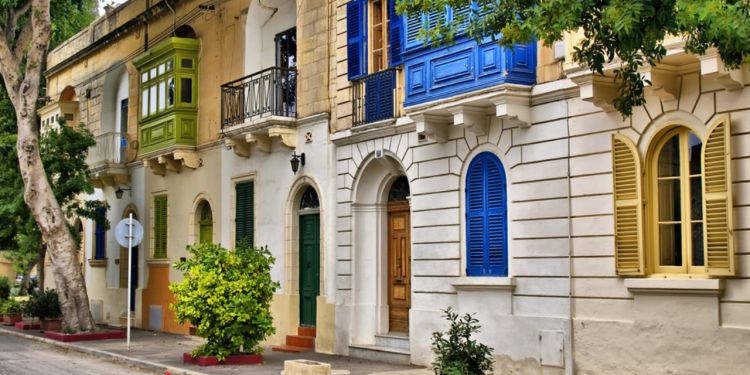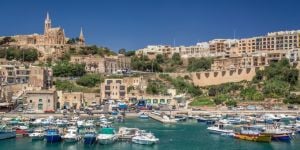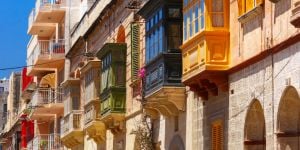
Maltese real estate market has been thriving in recent years. This is largely due to the increasing purchases by foreign nationals, which have dramatically reshaped the market in recent years. With low tax rates and few restrictions, expatriates can indeed enjoy a relatively straightforward process for buying real estate in Malta.
Benefits of buying property in Malta
The beauty of the landscapes, the mild climate, 300 days of sunshine per year, the very low crime rate, excellent healthcare infrastructure, the tax system, and the friendliness of the locals are some of the main factors that encourage expats to invest in the Maltese real estate market. It's a dense and tax-efficient market, appealing to both individuals and businesses. It attracts many foreigners, especially for the low taxes as well as the exemption from property and housing taxes.
Buying a property at a certain price makes you eligible for Maltese citizenship, subject to strict investment conditions. This is part of the Maltese Citizenship by Naturalization for Exceptional Services by Direct Investment programme. To learn more, check out our article “Obtaining Maltese Citizenship by Investment.” If the investment conditions are too strict for you, buying property in Malta can allow you to benefit from the Global Residence Programme (GRP) in Malta, a special tax status. For more information, see our article “Residence and Work Permits for Malta.”
Property purchase options in Malta
With small houses, apartments, character homes, luxury villas, the Maltese real estate market can meet all needs. Malta and Gozo are home to areas reserved for luxury commercial and residential properties, with high-end facilities and amenities. Moreover, owners can benefit from exemptions provided by Maltese legislation. Unlike some countries where the real estate market is declining, this is not the case in Malta. Investors appreciate, for example, the possibility of purchasing a property through a company or trust. This allows them to directly use the undistributed profits within the company. If there are no individual shareholders to remunerate, companies can use the undistributed profits without paying additional tax on dividends. This mechanism is also used for asset protection.
It is quite common in Malta for properties to be acquired in trust. Thanks to the Maltese Trusts and Trustees Act, buyers are assured that the property is maintained and managed in the best interests of the beneficiaries while optimizing the investment.
Expat-friendly regions for owning property in Malta
Malta is divided into three main islands, two of which are particularly attractive to foreigners. Malta, the main island, is the economic and cultural center of the country. As for other popular Maltese regions, there's Valletta, the capital, Sliema, Saint Julian's, Marsaskala, Marsaxlokk, Birkirkara, Saint Paul's Bay, and Mellieħa.
The high-end areas are located on the island of Malta in Portomaso, Cottonera, Fort Cambridge (located on the Tigné Peninsula in Sliema), Kalkara (The Shoreline Residences), Marsascala (Ta' Monita Residence), Madliena Village, and Manoel Island (future project). On the island of Gozo, there's Fort Chambray and San Lawrenz (Kempinski Residence).
Gozo, the second largest island, is much less developed than Malta. Nevertheless, it has a rich rural and cultural atmosphere. It is very popular with retirees, with a special mention for Victoria, the capital, also known as Rabat (not to be confused with Rabat in Morocco).
Finally, there are Marsalforn and Xlendi, other ideal areas for real estate investment in Gozo. As with most real estate transactions worldwide, it is preferable to be on-site and in person to choose the type of property, location, etc.
How to find property to buy in Malta
You have several options to find the house or apartment you've always dreamed of in Malta:
- Check classified ads on numerous specialized websites (for example, Propertymarket.com.mt);
- Read local newspapers;
- Use word of mouth;
- Approach real estate agents.
However, if you do not plan to reside in Malta, you can only buy in a SDA (Special Designated Area), unless you apply for an Acquisition of Immovable Property Permit (AIP) (see below).
The internet can be a great starting point for your property search in Malta. However, not all online listings are up to date, so don't rely solely on what you see online. Being in Malta greatly facilitates the search for real estate, as it allows you to request the help of a real estate agency. Just list your criteria and expectations (pool, garden, proximity to schools, etc.), as well as your budget.
Real estate agents take a commission, but they protect your interests by ensuring that the transaction goes as smoothly as possible. They also ensure there are no loopholes in the contracts and documents. Feel free to approach several real estate agencies to explore even more options.
Here are some well-known real estate agencies in Malta and Gozo: Alliance Real Estate, RE/MAX, Simon Mamo Real Estate, Dhalia Real Estate, Benestates, Zanzi Homes, and Frank Salt.
Types of properties available for purchase in Malta
Investing in real estate in a foreign country can be tricky. You need to know the market, the laws, the areas, etc.
There are different types of properties in Malta:
- Character homes - built over 100 years ago and generally located in typical Maltese villages;
- Luxury properties - a market for the most demanding (and wealthiest). Features include private pools, exceptional views, sumptuous decorations, etc.;
- Secondary residences - which allow you to reside in Malta for a few months a year without being a resident, and benefit from a particularly advantageous tax regime. They can be rented out when you're not residing there;
- Apartments - from studios to penthouses, catering to all budgets and tastes;
- Rental investments - renting is a common practice in Malta, and you too can become a landlord;
- Commercial premises - they offer excellent returns, about two to three times higher than rental housing;
- Offices - intended for entrepreneurs and professionals;
- Boutique hotels - small, generally with 10 to 30 rooms, a high-potential investment;
- New buildings - Malta is a small archipelago where the environment is protected in many places. It is becoming more difficult to find building land due to the lack of space, but opportunities still exist.
Do you need an acquisition permit in Malta?
The Acquisition of Immovable Property Permit (AIP) is a particular feature in real estate transactions in Malta. Although it's relatively easy to buy property in the country, you should be aware of the following:
- European nationals who have lived in Malta continuously for five years have the same rights as Maltese nationals in terms of property purchase, meaning they do not need an acquisition permit;
- European expats who want to buy a property for their primary residence also do not need an AIP;
- European nationals who have not lived in Malta continuously over the past five years and wish to buy a property for secondary residence purposes must apply for an AIP;
- Non-European nationals, regardless of the duration of their stay in Malta, must apply for an acquisition permit for both primary and secondary residences.
It is therefore advisable to gather all relevant information from the competent authorities or a reputable real estate agency.
Procedures for buying property in Malta
You will make an offer or discuss the sale price with the owner, preferably in the presence of the real estate agent, after a satisfactory visit to the property.
Then, you will sign a promise of sale, or Convenium (Konvenju), a legal document containing the details of the sale, including:
- The deposit amount, which is generally 10% of the total sale price;
- 1% of the total stamp duty as a provision. The total amount is 5%, and the balance will be due upon signing the final deed;
- Conditions related to the entire payment.
The entire transaction, as well as the title of ownership, will be verified by a notary (to determine if the property has already been mortgaged or is encumbered with debts).
A final sale date will then be set (either at the bank or before the notary), and you will sign the final deed. You can then transfer the total payment to the seller and pay the stamp duty to the Office of the Commissioner for Revenue, as well as all other fees to the notary or agent.
Regarding agency fees, they are shared between the buyer and the seller and amount to about 5% of the property's value. Add the notary fees, which start at 1% of the property's total value.
Good to know:
In Malta, there are no property or housing taxes. Property income is only taxed at 15%.
Important:
The official languages in Malta are Maltese and English. If you do not understand either, you will need to seek the help of an official translator or find a lawyer who speaks your language. This detail is essential to avoid signing a document without understanding its content.
Real estate prices in Malta
Regarding the budget, it really depends on you, your savings, and the kindness of your banker. It is quite possible to find a very pretty little character house for sale in a typical village for around 425,000 euros. In the city, real estate prices are higher, especially in popular neighborhoods like St Julian's or Sliema.
For a luxury property, prices can soar, sometimes reaching up to 5 million euros and more... As for apartments in Malta, a three-bedroom apartment with a sea view in Sliema costs on average between 900,000 euros - 1,300,000 euros. Prices are lower (around 300,000 euros) for smaller apartments or those without a sea view. In villages, they range between 150,000 euros and 900,000 euros (for large apartments in popular areas).
In Gozo, real estate prices are lower. You can find a townhouse or a house with a terrace for around 200,000 euros, although prices generally range between 400,000 and 600,000 euros. For an apartment in Gozo, expect to pay between 150,000 and 370,000 euros.
If the property you are interested in is new, you will also need to budget for a new kitchen, as this is not included in the price in Malta. If you buy an older property, you may need to set aside some money to install heating and air conditioning.
Obtaining a mortgage in Malta
Some banks in Malta may be reluctant to grant a mortgage to foreigners, but not all.
Expats wishing to secure a loan should plan for a maximum loan-to-value (LTV) ratio of 80%. In exceptional circumstances, you can borrow up to 90% of the property's price. Note that the LTV percentage will be based on the purchase price of the property OR its valuation, whichever is lower. Maltese banks generally offer a minimum loan of 25,000 euros and a maximum of 1,000,000 euros. The borrower must be at least 18 years old, while the maximum age of the borrower at the end of the loan must be 65 years.
To apply for a loan to buy property in Malta, you must follow the procedure below:
- Have a bank account in Malta;
- Request authorization from the Central Bank of Malta;
- Take out life insurance;
- Complete the application form;
- Provide the following documents: the preliminary property purchase contract, your identity document, proof of residence, and proof of your income (if you are employed or self-employed).
Important:
The income you expect to earn in the future from renting your new property in Malta is not counted as part of your income. Moreover, when applying for a loan in Malta, your monthly debt ratio (including the mortgage) cannot exceed 35% of your income.
Useful links:
Office of the Commissioner for Revenue
We do our best to provide accurate and up to date information. However, if you have noticed any inaccuracies in this article, please let us know in the comments section below.








